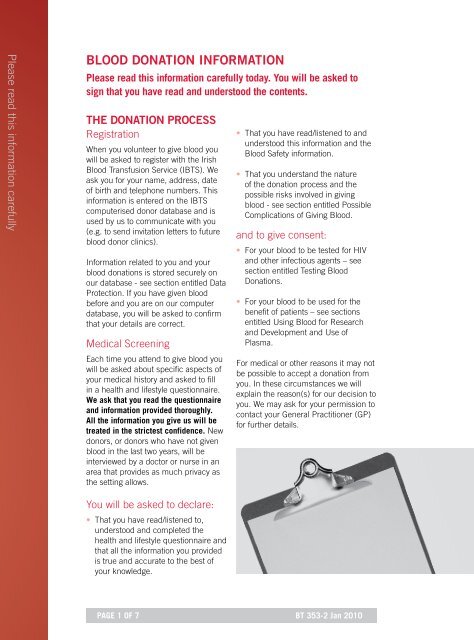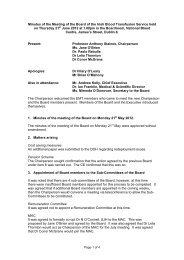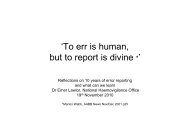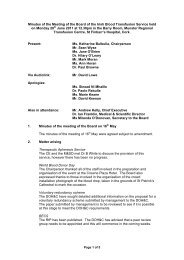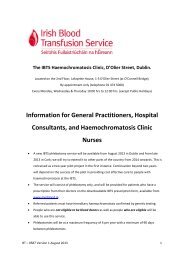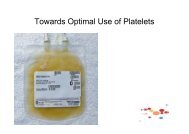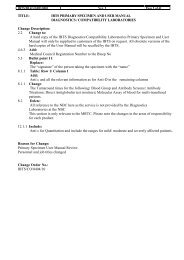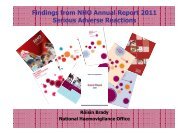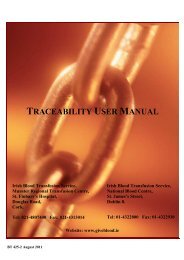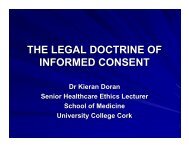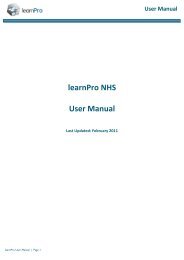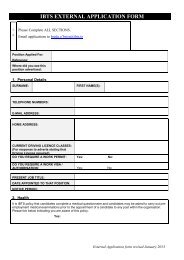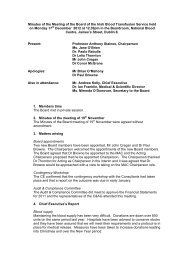BLOOD DONATION INFORMATION - Irish Blood Transfusion Service
BLOOD DONATION INFORMATION - Irish Blood Transfusion Service
BLOOD DONATION INFORMATION - Irish Blood Transfusion Service
Create successful ePaper yourself
Turn your PDF publications into a flip-book with our unique Google optimized e-Paper software.
Please read this information carefully<strong>BLOOD</strong> <strong>DONATION</strong> <strong>INFORMATION</strong>Please read this information carefully today. You will be asked tosign that you have read and understood the contents.The Donation ProcessRegistrationWhen you volunteer to give blood youwill be asked to register with the <strong>Irish</strong><strong>Blood</strong> <strong>Transfusion</strong> <strong>Service</strong> (IBTS). Weask you for your name, address, dateof birth and telephone numbers. Thisinformation is entered on the IBTScomputerised donor database and isused by us to communicate with you(e.g. to send invitation letters to futureblood donor clinics).Information related to you and yourblood donations is stored securely onour database - see section entitled DataProtection. If you have given bloodbefore and you are on our computerdatabase, you will be asked to confirmthat your details are correct.Medical ScreeningEach time you attend to give blood youwill be asked about specific aspects ofyour medical history and asked to fillin a health and lifestyle questionnaire.We ask that you read the questionnaireand information provided thoroughly.All the information you give us will betreated in the strictest confidence. Newdonors, or donors who have not givenblood in the last two years, will beinterviewed by a doctor or nurse in anarea that provides as much privacy asthe setting allows.• That you have read/listened to andunderstood this information and the<strong>Blood</strong> Safety information.• That you understand the natureof the donation process and thepossible risks involved in givingblood - see section entitled PossibleComplications of Giving <strong>Blood</strong>.and to give consent:• For your blood to be tested for HIVand other infectious agents – seesection entitled Testing <strong>Blood</strong>Donations.• For your blood to be used for thebenefit of patients – see sectionsentitled Using <strong>Blood</strong> for Researchand Development and Use ofPlasma.For medical or other reasons it may notbe possible to accept a donation fromyou. In these circumstances we willexplain the reason(s) for our decision toyou. We may ask for your permission tocontact your General Practitioner (GP)for further details.You will be asked to declare:• That you have read/listened to,understood and completed thehealth and lifestyle questionnaire andthat all the information you providedis true and accurate to the best ofyour knowledge.PAGE 1 OF 7 BT 353-2 Jan 2010
<strong>BLOOD</strong> <strong>DONATION</strong> <strong>INFORMATION</strong>What if I Change My Mind?If you are accepted for donationbut decide, for whatever reason,that you would rather not do so, youcan change your mind and leave theclinic at any time. We will not put anypressure on you to donate. We simplyask that you return your questionnaireto a member of our staff.If you have already donated and youhave doubts about whether your bloodshould be used for patients, pleasetalk to a doctor or nurse at the clinic.If you have left the clinic, pleasephone the National <strong>Blood</strong> Centre on01 4322800, or the Munster Regional<strong>Transfusion</strong> Centre on 021 4807400as soon as possible and ask to speakwith a doctor. There is a doctor on call24 hours a day. Please do not leave amessage on our Infoline 1850 731 137as this is not manned 24/7 and theinformation you give us may meanthat your blood is not suitable forpatients and has to be recalled fromthe hospital immediately.Giving blood too often can lead to lowlevels of iron in your body. This canoccur because every unit of bloodcontains between 200 - 250 mgs of iron.For your safety we recommend that youdo not donate blood more than 4 times ayear. For some donors a lesser numberof donations may be appropriate.Giving <strong>Blood</strong>After the medical screening process,you will be shown to one of thedonation beds. A pressure cuff will beput around your upper arm to makethe veins more prominent and thearea will be cleaned with antiseptic. Adoctor, nurse or specially trained donorattendant will then insert a needle thatis attached to a blood bag. Your bloodwill then flow through this needle intothe blood bag that is kept out of sightbelow the level of the bed. You will beasked to open and close your hand toensure smooth and consistent bloodflow. <strong>Blood</strong> samples are collected intubes at the time of donation so that wecan test them in our laboratory.Please read this information carefullyIf your blood passes this test, we will beable to accept a donation right away.Haemoglobin TestingHaemoglobin (Hb) is the protein inyour blood that carries oxygen. We testa small drop of blood from your fingerto make sure that you are not anaemic(i.e. that your Hb is low). If this testindicates that you may be anaemic, ablood sample may be taken from yourarm for an additional Hb test. If yourblood passes this test, we will be ableto accept a donation straight away.If not, the sample will go back to the<strong>Blood</strong> Centre for further testing. We willget back in touch with you if the resultindicates that you should attend yourGP for further advice. On occasion wealso take a sample from your donationto confirm your Hb level.A member of staff will keep a close eyeon you and on the blood bag to makesure that everything is going well. Mostpeople fill the blood bag in 8 to 15minutes. It holds 470 mls of blood (justunder a pint). If, for any reason, theblood flow is slow, it may be necessary tostop the donation early. If you experienceany pain or discomfort where the needleis inserted bring this to the immediateattention of a member of staff.When the donation is completed, theneedle will then be carefully removedfrom your arm and a dressing applied.You will be asked to press directly andfirmly on the site where the needle wasinserted for 2 to 3 minutes, keeping yourPAGE 2 OF 7 BT 353-2 Jan 2010
<strong>BLOOD</strong> <strong>DONATION</strong> <strong>INFORMATION</strong>Please read this information carefullyarm straight. This is important in helpingto prevent bruising.There is no risk of contracting anydisease by donating blood. A newsterile blood pack is used for everydonor. It is never reused.RestingYou will then be advised to rest fora short period before going to thecanteen area where you will be offereda drink and light refreshments. Weadvise that you remain in the bloodcompany with your details and thedetails of the incident.BruisingSometimes bruises develop after givingblood due to seepage of blood fromthe vein into the tissues of the arm.Bruises are not usually serious. Mostare small and fade within a few days.On occasion the bruising may worsenand become painful. Very occasionallya bruise may become infected and youmay need treatment with antibiotics.I don’t have to butit feels good to do my bit.donor clinic for at least 15 minutesafter your donation to make sure thatyou are feeling well.Possible Complications ofGiving <strong>Blood</strong>For the vast majority of people theprocess of giving blood is a verysimple and trouble-free experience.However, problems sometimes ariseduring or after a donation. We haveoutlined some complications of givingblood here, so that if they occur, youwill know what to do. We ask that youlet one of our staff know immediatelyif you feel faint or unwell during orafter your donation or if you have pain,discomfort or altered sensation in yourarm. If you do have a problem, we arerequired to report this to our insuranceTo minimise the risk of bruising, we askyou to press firmly on the needle site forat least 2 - 3 minutes after the needle isremoved. We also ask that you limit theuse of your donation arm for the first 15minutes after giving blood. Ideally youshould avoid using the arm from whichthe donation was taken for heavy workor recreational activities for a period of12 hours.If you experience any of the followingafter donating you should contact theNational <strong>Blood</strong> Centre on 01 4322800 orthe Munster Regional <strong>Transfusion</strong> Centreon 021 4807400 or contact your GP:• Severe pain in your arm• Numbness or persistent ‘pins andneedles’ in your arm, hand or fingersPAGE 3 OF 7 BT 353-2 Jan 2010
<strong>BLOOD</strong> <strong>DONATION</strong> <strong>INFORMATION</strong>• Swelling that is large or increasing in size• Painful redness or inflammation.Bleeding from the needle siteIf this happens immediately aftergiving blood:• Lift your arm above your shoulder andpress on the needle site.• Sit down and ask for assistance fromour staff.You can avoid bleeding by pressingfirmly on the needle site after theneedle is taken out and by limitingthe use of your donation arm for 15minutes after giving blood. Be carefulwhen eating and drinking and whenputting on your coat after donating.Please leave the plaster in place for 24hours after donating.Fainting/feeling weak orlight-headedSome donors feel faint during or aftergiving blood. If you feel faint during orafter your donation please let one of ourstaff know immediately.If you feel faint after leaving the clinicyou should sit down straight away (onthe ground if necessary). Put your headbetween your knees for a few minutes.Lie down if you need to. Stay sitting orlying for around 30 minutes or until youfeel well again. Make sure that whenyou get up you do so slowly. If you stillfeel faint, lie down again.Have a cold non-alcoholic drink whenyou feel well enough to do so. If youlose consciousness (pass out) afterdonating contact us on the abovenumbers for further advice. Wegenerally advise that donors who loseconsciousness after they leave theblood donor clinic, do not donate again,in the interests of their own safety.Reducing the risk of faintingBefore giving blood we advise that you:• Eat something in the 3 hours beforeyou donate• Drink plenty of non-alcoholic liquidbefore attending the donor clinic• Drink a glass of water / juice at theclinic before you donate• If you have naturally low bloodpressure and feel faint when youstand up suddenly, please tell us• If you are very anxious, please let usknow, so that we can help you feel atease.After giving blood we advise that you:• Stay in our clinic for at least 15minutes after donating• Have some light refreshments in ourcanteen during this time• Do not smoke for at least an hour• Drink plenty of non-alcoholic fluids• Do not have a hot bath on the dayyou donate• Avoid standing for long periodsespecially in poorly ventilated areas• Avoid strenuous exercise until thenext day• Avoid any activity that may present ahazard to you or others were you tobecome weak or light-headed.If you are involved in a hazardousoccupation or hobby such as operatingheavy machinery or mountaineering,you should defer the activity until thenext day or sometimes longer. Pleasecheck with us, so that we can adviseyou appropriately if this applies to you.Please read this information carefullyPAGE 4 OF 7 BT 353-2 Jan 2010
<strong>BLOOD</strong> <strong>DONATION</strong> <strong>INFORMATION</strong>Please read this information carefullyUncommon risks ofdonating bloodNerve Injury/Nerve irritation/PainWe ask that you let one of our staff knowimmediately if you have pain, discomfortor altered sensation in your arm, duringor after your donation.Very infrequently, insertion of theneedle may cause inflammation in yourarm or irritation of a nerve. Our staffare fully trained to recognise these rarecomplications, and you will be givenimmediate treatment and appropriateadvice. If these occur after you haveleft the blood donor clinic, you shouldcontact us on the above numbers orcontact your GP.Tendon Injury/PainOn rare occasions a needle maycome into contact with a tendon andcause a sharp pain when the needle isinserted. Please tell us immediately ifyou experience any pain or discomfortwhen the needle is inserted.Arterial punctureRarely the needle may inadvertently beinserted into an artery. If this happensthe needle will be removed immediatelyand you will be given immediatetreatment and appropriate advice.Fast pulse or tightness in the chestVery rarely a donor may develop a fasterthan normal pulse or a sensation oftightness in the chest. If this happenswhile giving blood, alert us immediately.Serious complications resulting in injuryor hospitalisationWe collect around 160,000 donations ofblood every year. About once or twice ayear a donor may need to be admittedto hospital as a result of a complicationof giving blood. This could occur, if forexample, a donor faints and bangs his/her head resulting in an injury.Serious injuries can occur if a donorfaints after he/she has left the blooddonor clinic. This is called a ‘delayedfaint.’ The risk of a delayed faint will begreatly reduced by following the stepsoutlined above to reduce the risk offainting.If you become unwellafter donatingIf you become unwell or develop anyillness after donating or have any doubtsabout whether your blood should beused for patients, it is essential that youtalk to a doctor at the National <strong>Blood</strong>Centre on 01 4322800 or the MunsterRegional <strong>Transfusion</strong> Centre on 0214807400 as soon as possible. There isa doctor on call 24 hours a day who willadvise you and will decide if your bloodis suitable to give to patients.Please do not leave a message on ourInfoline 1850 731 137 as this is notmanned 24/7 and the information yougive us may mean that your blood isnot suitable for patients and has to berecalled from the hospital immediately.Testing <strong>Blood</strong> DonationsCertain tests are performed on everydonation, no matter how many timesyou have given blood. Currently themandatory tests are those for HIV,hepatitis B, hepatitis C, HTLV (a viruscarried in the blood) and syphilis.If your blood gives a positive result forany of these infections your donation willbe discarded and you will not be eligibleto donate again. We will write and informyou and ask that you attend for furtherconfirmatory tests and advice.The IBTS is legally bound to inform thePublic Health Authorities if your testsconfirm that you are positive for hepatitisB or hepatitis C or syphilis. We arePAGE 5 OF 7 BT 353-2 Jan 2010
<strong>BLOOD</strong> <strong>DONATION</strong> <strong>INFORMATION</strong>obliged to forward your personal detailsincluding your name and address andthe results of your blood tests.Your blood is also tested to determineyour blood group. In additionsupplementary tests may be carriedout on selected donations, for exampleto meet the special needs of certainpatients such as babies. These extratests include more detailed bloodgrouping, a test for sickle cell traitand, very occasionally, tests for otherrelevant proteins in the blood. Wewill notify you of any results that mayaffect your health. The range of bloodtests carried out by the IBTS is underregular review and other tests may beintroduced in the future. We freeze asmall sample of your blood and retainit indefinitely. This is done in caseit becomes necessary to carry outadditional tests at a later date.False Reactions in our TestsWe have to carry out a range of tests oneach donation. In a small percentage ofdonors, the donor’s blood gives a falsereaction in our tests (a false positivereaction). Whilst there are no healthimplications for the donor, such testingproblems prevent use of the blood. Youwill be informed of such false reactionsif they occur. For further information seeour leaflet on False Positive Reactions.Using <strong>Blood</strong> for Research andDevelopmentWe would like donors to know that, onoccasion, their blood may be used forpurposes other than direct transfusionto patients. We sometimes use parts ofdonations that are not given to patientssuch as white cells, or donations thathave not been used within their shelflife, for laboratory work, educationand training, or for research anddevelopment within the IBTS, the Health<strong>Service</strong> or the Universities/Institutes ofTechnology. The IBTS does not receiveany payment for this service.As part of our commitment to a highquality service, on occasion, donationsthat are within their shelf life areused for validation/quality assurancepurposes within the IBTS. This couldhappen for example, when a new bloodpack or filter is introduced to ensurethat it meets all the required standards.Another example would be wheredonated blood or blood samples areused to validate test kits and equipmentand in the assessment of a new bloodscreening test. These samples mayalso be used to provide information fordonors on the risk of screening positivein a new test, or to provide estimatesof the rate of other infections in thepopulation. If part of a donation orsamples is used for these purposes,we will ensure, where appropriate, thatyou cannot be identified so that thereis no link between any personablyidentifiable data and the sample(unlinked, anonymised testing) andthat approval from an ethics committeeis obtained where necessary.Using blood in all of the above ways isof benefit to patients. By signing theDonor Declaration on the health andlifestyle questionnaire you are givingconsent to proceed with the donationand that your donation may be used forany of the purposes outlined above.We would also like our donors to knowthat at times their blood is not used.This may happen if the donation was nota complete donation or if the donation isnot used before its expiry date.Use of plasmaEvery whole blood donation is made upof red cells, white cells and platelets,which are suspended in plasma,Please read this information carefullyPAGE 6 OF 7 BT 353-2 Jan 2010
<strong>BLOOD</strong> <strong>DONATION</strong> <strong>INFORMATION</strong>Please read this information carefullythe liquid portion of blood. Patientsrequiring blood transfusions are given acomponent, usually red cells or platelets.Since 2001, the IBTS has not usedplasma from <strong>Irish</strong> donors, because ofa risk of transmitting vCJD through thisparticular component. Plasma for <strong>Irish</strong>patients is imported from the USA whichis a BSE low risk area. The US donorsare voluntary unpaid donors and theirplasma is manufactured into a licensedproduct.As plasma from <strong>Irish</strong> donors is notgiven to patients, it is disposed ofthrough incineration. Plasma canbe used in other ways that indirectlybenefit patients, for example in ethicallyapproved medical research, qualitycontrol or for teaching purposes.Recently, the IBTS has agreed tosupply the waste material, plasma(currently incinerated at a cost) tothe manufacturing sector for use inpreparing healthcare related laboratorytests. The IBTS will receive paymentfrom this collaboration which will help tooffset some IBTS costs and is thereforeof benefit to the health service.The IBTS believes that it is important thatdonors know how their blood donationsmay be used, including what happensto surplus/waste components from theprocessing of your life saving gift.This information may also be usedfor research in order to improve ourknowledge about the blood donorpopulation, and for clinical audit, toassess and improve the quality of ourservice. Wherever possible, all suchinformation will be anonymised.All information and data that isprocessed by the IBTS is in accordancewith the provisions of the Data ProtectionActs. You have a right of access toyour donor records. If you want toaccess your records, contact Donor<strong>Service</strong>s at the National <strong>Blood</strong> Centreon 01 4322800 or Munster Regional<strong>Transfusion</strong> Centre on 021 4807400.Further InformationIf you have a question at any time youcan phone our Infoline on 1850 731137. This is open Monday to Fridayfrom 9 a.m. to 5 p.m. You can alsovisit our website on www.giveblood.ie or email us at contactus@ibts.ie.Details of our clinics are available onour website.If you need any information or have aquery while you are at the blood donorclinic please speak with a member ofour clinic staff.Data ProtectionThe IBTS holds donor details, donationdetails and test results on a securecomputerised database. This databaseis used by the IBTS to communicatewith donors and to record their donationdetails, including all blood sample testresults. It is also used for the proper andnecessary administration of the IBTS. Allthe information held is treated with thestrictest confidence.PAGE 7 OF 7 BT 353-2 Jan 2010


